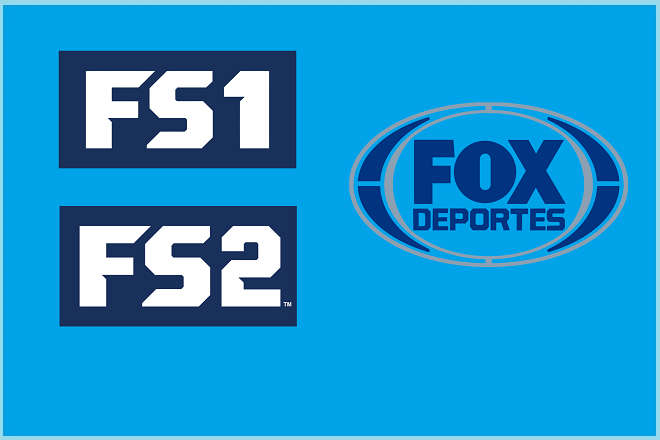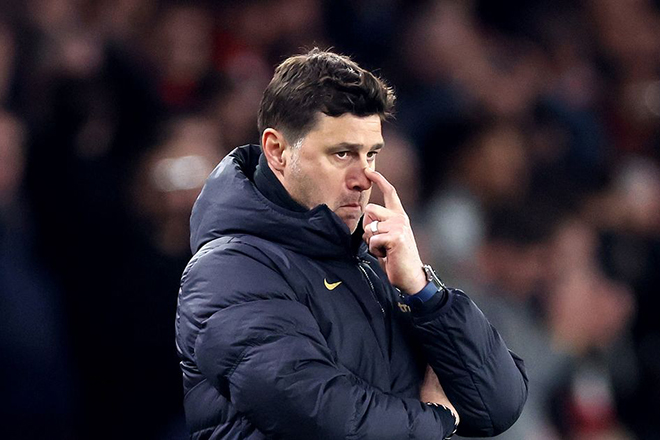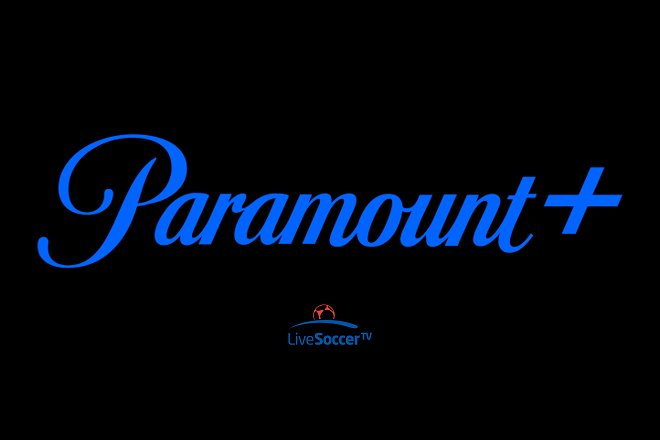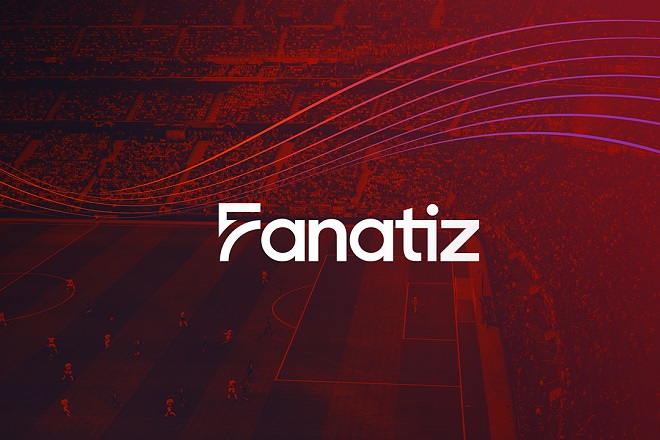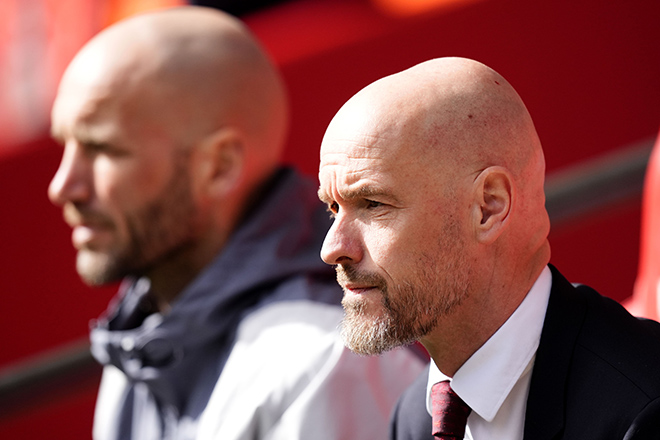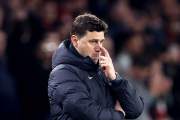As two of the most widely followed teams on the planet square off this Saturday in yet another edition of the famous "El Clasico" clash, there will be more than just victory on Barcelona fans' minds. Earlier this season, the Blaugrana thrashed Real Madrid in a comfortable 4-0 win at their opponents' home ground and are in a good position to complete a double over their bitter rivals whilst effectively sealing the 2015/2016 La Liga title race.
The glitz and glamour that is normally associated with any game between these two Spanish giants, however, will be overshadowed somewhat due to the unfortunate passing of a Barcelona icon renowned both for his success as a player and as a manager. On March 24, 2016, the world was rocked by news of the death of legendary Dutch attacker Johan Cruyff at the age of 68 after a battle of cancer. Not surprisingly, tributes poured in to honor the man who was highly instrumental in not giving Barcelona a new identity but also has impacted the way the Catalan powerhouse even plays football today.
Icon: It is only fitting that El Clasico will be played at Camp Nou, where many tributes will take place in honor of Barcelona icon Johan Cruyff
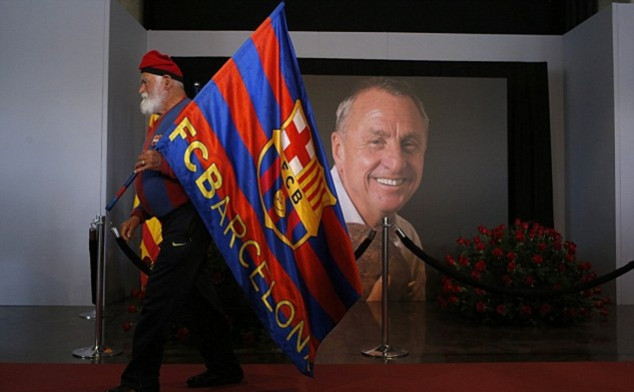
So, without much ado, we take a brief look at Cruyff - his accomplishments as a player, manager, and yes, even a video of that famous "Cruyff Turn" ahead of this weekend's most highly anticipated game.
1973-1978: Cruyff and Barcelona meet for the first time...and it's a marriage made in heaven
In 1973, the then 26-year-old Cruyff was transferred from Dutch powerhouse Ajax to Barcelona for about $2 million - which, at that time, was a world-record transfer fee. Due to a ban on signing foreign players, he did not make his debut until October in a league tie against Granada. It may shock fans today, but the 1960's and first part of the 70's were not a good time for Barcelona: at the time Cruyff arrived, they were actually barely out of the relegation zone and had not won a La Liga title since the 1959/1960 season.
Well, at the end of his debut term, the already-highly decorated Ajax star had guided the once-floundering Blaugrana back to the pinnacle of Spanish football, and Barcelona clinched their first ever league title in 14 years when they were crowned champions at the end of the 1973/1974 term.
Although his trophy count whilst at Camp Nou (in addition to the league crown, he also won a Copa Del Rey title in 1977/1978) was quite sparse compared to the massive haul achieved at Ajax, he quickly became a fan favorite both for his performances and his outspoken political views in favor of Catalan nationalism.
Cruyff's vocal support of Catalan independence - even going so far to name his son "Jordi" further endeared him to Barcelona's core fanbase
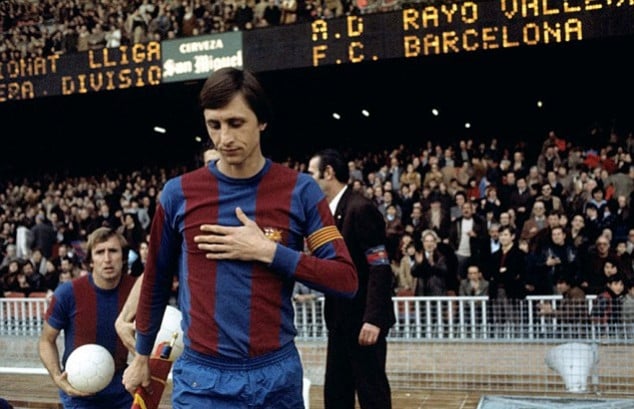
Some notable achievements during his debut season included going over 20 games sans defeat. But arguably most significant for any Blaugrana supporter was when they trounced arch-rivals Real Madrid 5-0 at the capital side's home stadium in February 1974. And it was whilst with Barcelona that he won his third Ballon d'Or title in 1974; his prior two were earned in 1971 and 1973 during his time at Ajax.
In 1971 he made history as the first Dutch (and Ajax) player to win the award. Until Michel Platini and Marco Van Basten, Cruyff was also the first player to win three Ballon d'Or titles - this, of course, has been topped even further by another Barcelona superstar: Lionel Messi, who has five so far.
After a brief sojourn in the USA, he returned to Europe for another spell with Ajax, but eventually ended up finishing his career with Ajax's rivals Feyenoord and then turned his attention to coaching. And this is where he really began to make his mark on the footballing world, starting with his time at Ajax.
1988-1996: The beginnings of a a footballing philosophy at Barcelona that still hold true today
In 1988, Cruyff returned to the famed Camp Nou as a manager, and it was under him that arguably Barcelona developed the identity and style of play that has been copied in some forms by teams like Spain, the Netherlands, Bayern Munich, and Germany. It was also during this time that Cruyff managed players like Pep Guardiola, Txiki Begiristain, Ronald Koeman, Michael Laudrup, and Romário, and this side quickly became known as the "Dream Team".
A summary of Cruyff's trophies won during his spell at Barcelona included four consecutive La Liga titles from the 1990/1991 to the 1993/1994 seasons, 3 Spanish Super Cups, and most important, two European titles. The most notable of these two was their victory in the 1992 European Cup, which was the first ever Champions League title won by Barcelona. On May 20, 1992, a brilliant free-kick from Dutch star Ronald Koeman in extra time was enough to decide the tie contested at Wembley Stadium. And Barcelona's opponent on that day? The answer might surprise most: it was Serie A outfit Sampdoria.
In 1992, Barcelona won their first ever European title under Cruyff's tutelage after beating Italian side Sampdoria at Wembley
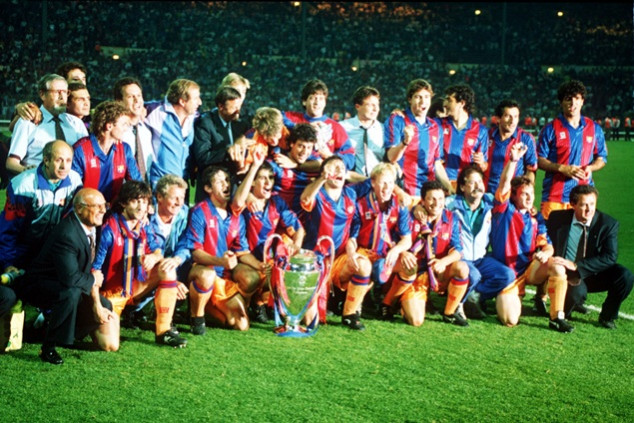
In total, Cruyff won 11 trophies, which was the most of any Barcelona manager until Guardiola topped his former manager in winning 15. Although his final couple of seasons were quite disappointing, with Barcelona not winning any trophies, there are two things that still stand, even after his departure from the club, and even after his passing.
The youth academy and playing style: Two main footballing concepts attributed to Cruyff
The first is Barcelona's famed youth academy, La Masia. Cruyff wanted the Spanish powerhouse to have a youth facility modeled on the one at Ajax, and in 1979 it began to operate as it is known today. Players like Guardiola, Messi, Sergio Busquets, Andres Iniesta, Xavi, and many more have spent all or parts of their youth within this world-renowned footballing academy. Even today, La Masia still continues its policy of cultivating young players in the same footballing style as the senior team so as to facilitate their transition from youth football to first-team action.
The second, of course, is the playing style the world knows as "tiki-taka". This system which focuses on short passing and keeping possession at all costs has been associated with Barcelona for quite some time, but first really became more known starting in 2008. Given that a significant number of Spanish national team players play their club football for Barcelona, it is no surprise that tiki-taka soon became La Furia Roja's style of play.
From 2008 to 2012, Spain were the champions of Europe and the world, winning two EURO titles and a World Cup trophy. Meanwhile, Guardiola, who was a pupil of Cruyff, has implemented some of his Barcelona background whilst managing Bayern Munich; that in turn, has also influenced the German national team. For instance, Manuel Neuer, who is oftentimes seen dribbling the ball out of his own box or completing passes of his own, is representative of the keeper Cruyff had sought - an additional player to help with moving the ball - and not just a mere shot-stopper.
Although Luis Enrique - who arrived shortly after Cruyff's departure - did not play under the Dutch tactician, he nonetheless is managing quite a few players who grew up in La Masia and as such, Barcelona's style of play largely has not changed despite the addition of new players like Neymar and Luis Suarez.
In 2015, Barcelona celebrated their fifth Champions League title after beating yet another Italian side - Juventus - in Berlin, and several La Masia pupils were part of that squad
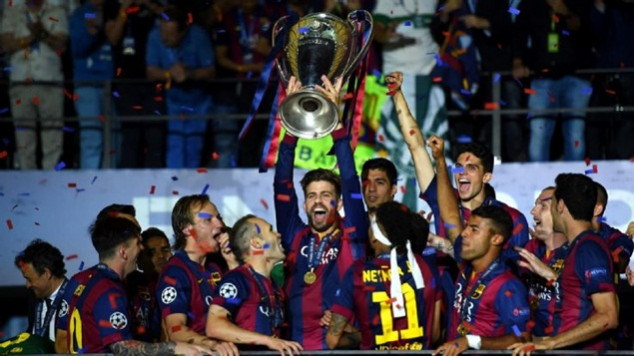
Cruyff's legacy will never be forgotten: The famous turn and his impact following his departure from Camp Nou
Although he is no longer alive, Cruyff's legacy will never be forgotten. In addition to implementing a unique playing style as well as being instrumental in creating a world-class youth academy, there are a few more things attributed to the legendary Dutch star.
First up is that legendary "Cruyff turn". How many players actually have a move named after them? Not many.
As many fans were not even born yet when this happened, here is a clip (note, this may not be available in your country, depending on wherever you are based):
And here is one of Bayern Munich star Manuel Neuer trying his hand at it during a couple of games:
Finally, here is a statistical look at Barcelona before, then during and after Cruyff's arrival:
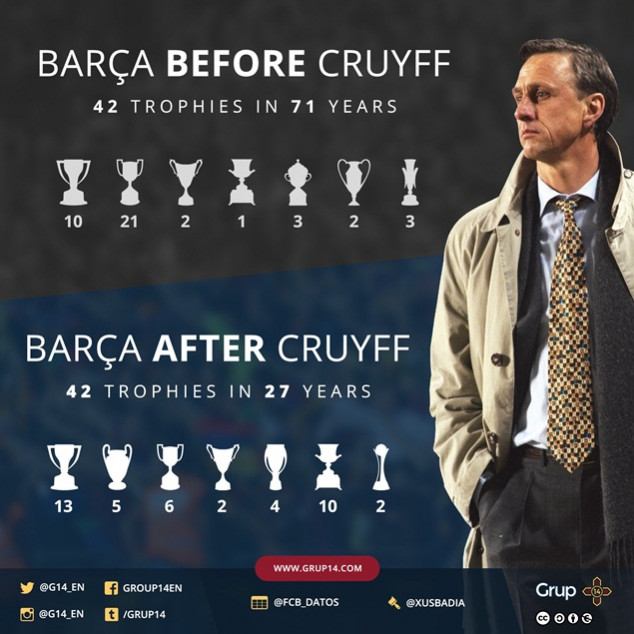
On Saturday, all eyes will be on superstars Lionel Messi, Luis Suarez, and Neymar - and their opposing attackers Karim Benzema, Gareth Bale, and of course, Cristiano Ronaldo as well as all the other supporting stars on the pitch. However, for many of Barcelona's stars, Cruyff will be firmly on their minds - whether they worked with him directly or not.
"The best tribute we can pay Cruyff is to do everything he taught us," midfielder Andres Iniesta noted recently in a press conference. "[There] is the legacy Cruyff has left all of us, [for] 'Culés' in particular, but also the football world in general, [and] we want to win [El Clasico] so we can dedicate it to him."
Match details, result and original broadcast info
This match has ended. Below are the original Live broadcast details for this match.
 Live TV coverage and streaming in United States
Live TV coverage and streaming in United States




Follow the game on-the-go
Download our iOS and Android apps to follow soccer on-the-go. It comes packed with features - live scores, fixtures, results, tables, line-ups, stats, TV schedule and much more! Sorry, no live streaming within the app.

 Live TV coverage and streaming in United States
Live TV coverage and streaming in United States